Mystery of Edwin Drood (The)
Musical (1985)
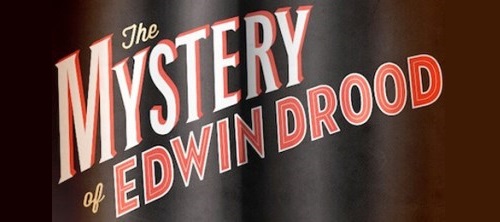
Inspiration
The musical Drood is derived from two major inspirations: Charles Dickens's final (and unfinished) novel, The Mystery of Edwin Drood, and the British pantomime and music hall traditions that reached the height of their popularity in the years following Dickens's death.
Dickens's Mystery began publication in 1870. The book, which had been written and published in episodic installments (as had most of Dickens's other novels) was left unfinished upon Dickens's sudden death from a stroke that year. The lack of resolution to the mystery (and the absence of notes that would indicate Dickens's intentions) have made The Mystery of Edwin Drood a literary curiosity. Almost immediately after the publication of Dickens's last episode, various authors and playwrights (including Dickens's own son) attempted to resolve the story with their own endings: by the time of the Drood musical's production, there had been several "collaborations" between the late Dickens and other novelists, numerous theatrical extrapolations of the material, and three film adaptations of the story.
Contemporaneous with Dickens's writing, British pantomime styles — distinguished by the importance of audience participation and conventions like the principal boy — reached their height of popularity, just as music hall performance with its attributes of raucous, risque comedy and a distinctive style of music began to achieve prominence.
Rupert Holmes, who would go on to be the major creative contributor to the musical Drood, spent his early childhood in England. At age three, he would experience theater for the first time when he was taken to a modern "panto", complete with cross-dressing lead boy and audience sing-alongs. Some years later, as an 11-year-old boy fascinated by mystery books, Holmes first discovered the unfinished Dickens novel. Both of those seminal experiences would go on to have a major impact on Holmes when he was first approached to write a new musical by impresario Joseph Papp.
Concept
Holmes, a well-known popular songwriter whose songs had been performed by the likes of Barbra Streisand, and who had himself recorded the #1 hit "Escape (The Piña Colada Song)" in 1979, first became interested in writing a musical in 1983. Following a nightclub appearance during which Holmes performed some of his "story-songs" while sharing humorous anecdotes, Holmes received a note from Gail Merrifield, director of play development at the New York Shakespeare Festival (and wife of Joseph Papp, the creator and head of the Festival), who had seen Holmes's performance and suggested that he write a full-length musical.
Drawing on his recollections of pantomime and Dickens's novel, as well as later experiences with Victorian-style music hall performance, Holmes conceived the central premises of the show. From the Dickens work, Holmes took the central plot and most of the featured characters. From music hall traditions, he created the lead character of "The Chairman", a sort of Master of Ceremonies and instigator of the action on stage. And from pantomime he retained the concept of the "Lead Boy" (always portrayed by a young female in male drag) and the most ground-breaking aspect of Drood, audience participation.
Drood is unusual in part because of Holmes's feat of writing the book, music, lyrics, and full orchestrations for the show. Though Holmes believed no Broadway creator had done this before, and despite frequent mentions of this feat in articles and reviews of the show, the practice was not entirely uncommon in the early days of musical theater. Songwriters including Adolf Philipp, were previously credited with the books to their musicals. However, none of these composer/librettists had written their own orchestrations as well.
In writing the book, Holmes did not let Dickens overshadow his own intentions. Rather than imitate Dickens's writing style, which he felt would be too bleak for the kind of show he wished to write, Holmes employed the device of a "show-within-a-show." The cast members of Drood do not specifically play Dickens's characters, but rather music hall performers who are performing as Dickens's characters. This device allowed for a great deal of light comedy that was not originally found in Dickens's novel to be incorporated into the show, as well as several musical numbers that were unrelated to the original story. In explaining this decision, Holmes was quoted as saying, "This is not Nicholas Nickleby set to music--it's not a Dickensian work. It's light and fun and entertaining. But I hope--I think--that Dickens would have enjoyed it." Holmes has also pointed out that "It has the same relationship to Dickens that Kiss Me Kate does to The Taming of the Shrew." The pantomime concept also allowed Holmes to employ a female in the lead male role, which further allowed him to write a love song designed to be sung by two sopranos.
Most inventively, Holmes employed a novel method of determining the outcome of the play: having the audience vote for an ending. At a break in the show, the audience votes on who killed Drood (if, indeed, he was killed at all), the identity of the mysterious Dick Datchery, and on which two characters will become romantically involved in the end, creating a happy ending. Since every audience differs in temperament, the outcome is theoretically unpredictable even to the actors, who must quickly tally the votes and commence with the chosen ending (although some smaller companies will "fix" the results to limit the number of possible endings). This device required extra work from Holmes, who had to write numerous short endings which covered every possible voting outcome.
Productions
After Rupert Holmes wrote an initial draft that lasted three-and-a-half hours, and performed it, solo, for Joseph Papp, Gail Merrifield, and Wilford Leach, (the New York Shakespeare Festival's artistic director), Papp offered to produce the show as part of the Festival (also known as "Shakespeare in the Park"), and told Holmes that it would be immediately transferred to Broadway if it was deemed a success. The original production of The Mystery of Edwin Drood premiered in New York City's Central Park at the Delacorte Theatre on August 21, 1985 after only three weeks of rehearsals. Notably, Holmes conceived most of the orchestrations himself, a rarity for a Broadway composer.
After the final Festival performance on September 1, preparations for the Broadway transfer (retaining the original cast) immediately got underway. Following a great deal of editing (the Delacorte version contained 32 original songs and was nearly three hours long) The Mystery of Edwin Drood opened on Broadway at the Imperial Theatre on December 2, 1985. Roughly halfway through the run, the title of the musical was officially shortened to Drood (the name it continues to be licensed under). The show ran for 608 performances (not including 24 previews), and closed on May 16, 1987. The Broadway production was produced by Papp and directed by Leach, with choreography by Graciela Daniele.
The opening night cast of the Broadway production starred George Rose, Cleo Laine, John Herrera, Howard McGillin, Patti Cohenour, and Jana Schneider, who were all nominated for 1986 Tony Awards for their performances, as well as Betty Buckley in the title role. Donna Murphy, Judy Kuhn, and Rob Marshall were also members of the ensemble. (Marshall, who would later become best known as a choreographer and theater/film director, also received an early choreography credit as assistant to Daniele.) Before the show ended its run, Murphy, who was understudy to Cleo Laine and Jana Schneider, took over the title role. Other notable replacements during the show's run included Alison Fraser (taking over for Jana Schneider), Paige O'Hara (taking over for Donna Murphy as Drood), as well as Loretta Swit and later Karen Morrow, who stepped into Laine's roles.
In 1988, several months after closing on Broadway, a slightly-revised version of Drood began its first North America tour at the Kennedy Center Opera House in Washington, DC, with Rose, Schneider and O'Hara reprising their leads, and Jean Stapleton playing Laine's role. During a break in the tour George Rose returned to his home in the Dominican Republic, and sadly was murdered during his stay.Rose was succeeded by Clive Revill. The show, now licensed by Tams-Witmark, has since has enjoyed a second U.S. national tour, a 1987 West End run at the Savoy Theatre in London, a production at the Shaw Festival in Niagara-on-the-Lake, Ontario, Canada; and numerous regional and professional and amateur theatrical productions worldwide. In 2007–08, a London revival, presented as a chamber piece and directed by Ted Craig, ran at the Warehouse Theatre.
In the summer of 2009, the Idaho Shakespeare Festival put on a production of Drood, starring resident actors Aled Davies as The Chairman, Lynn Allison as Princess Puffer, and Sara M. Bruner in the title role.
In 2012 Aria Entertainment produced a London revival of the musical at the Landor Theatre in April/May, which is shortly to transfer to the Arts Theatre, West End for a limited season from 18 May. The cast is headed by former Coronation Street star Wendi Peters as Princess Puffer, with Natalie Day as Edwin Drood, Daniel Robinson as John Jasper and Victoria Farley as Rosa Budd. The production is directed by Matthew Gould.
The Roundabout Theatre Company presented a Broadway revival at Studio 54, which opened in November 2012. The production is directed by Scott Ellis, and stars Chita Rivera as Puffer, Stephanie J. Block as Drood, Will Chase as Jasper, Jim Norton as the Chairman and Gregg Edelmann as Crisparkle.
This hilarious musical whodunit was a smash hit on Broadway where it received rave reviews. Loosely based on Charles Dickens' famous unfinished novel, it takes audience participation to new heights by letting them directly effect the play's outcome by voting for whomever they think murdered the unfortunate young Edwin Drood. Presented as a 'first night performance by The Music Hall Royale', a troupe of decidedly hammy Victorian actors, this affectionate recreation of a bygone theatrical age is certain to prove an enormous hit with everyone.
Afficher le synopsis détaillé
Act I
At London's Music Hall Royale, preparations are underway for the premiere performance of the resident troupe's version of "The Mystery of Edwin Drood." Members of the troupe (who venture out into the seats) explain to audience members the historical details of Dickens's untimely demise, as well as the role the audience will play in determining the outcome of the mystery. From various locations in the theater, the cast members perform the opening number, "There You Are." The Chairman, a kind of Master of Ceremonies, informs attendees that this is going to be an unusual production, and invites all to be as "vulgar and uncivilized as legally possible." With this announcement, the play-within-the-play gets underway.
The first Dickens character introduced is the choirmaster John Jasper, a "respectable" member of society who shares with the audience the fact that he actually suffers from inner torment ("A Man Could Go Quite Mad"). Next to be introduced is Jasper's nephew, Edwin Drood (whom the Chairman reveals is being played by the famous male impersonator, Miss Alice Nutting), who discusses his impending arranged marriage with Rosa Bud, as well as his plans to leave for Egypt after the wedding ("Two Kinsmen").
Drood's fiancee, Rosa Budd, is then introduced at the "Nun's House" (a ladies' seminary). It is her birthday, and Jasper, her music tutor, has composed a song for Rosa ("Moonfall") which he insists on hearing her sing. During the encore, two orphans from Ceylon, Neville and Helena Landless, enter with the Reverend Mr. Crisparkle. After Rosa faints from the lustful lyrics of Jasper's song, Helena comes to her aid ("Moonfall Quartet") while Neville displays an attraction to Rosa. Next to introduce herself is the Princess Puffer, the madame of an opium den ("The Wages of Sin"). We see that respectable Jasper is himself a customer of the den, and, as he dreams of Drood and Rosa, Puffer reacts when she hears Rosa's name.
Back in Cloisterham, the gravedigger Durdles and his Deputy enter to discuss a newly completed tomb for the wife of Mayor Thomas Sapsea. It is announced that the actor playing Sapsea is too drunk to perform, so the Chairman himself takes over the role.
The following day, Rev. Crisparkle introduces Edwin and the Landless twins. When Drood shares his plan to pave a desert highway with stones from the Egyptian pyramids, he offends his new rival Neville and his sister: the three then proceed to argue ("Ceylon"). When Jasper enters with Mayor Sapsea, he points out to the mayor that everything is not always what it seems, a statement the Chairman, confused by his dual roles, agrees with. ("Both Sides of the Coin").
Jasper sneaks around the cemetery, where he obtains a key to Mrs. Sapsea's tomb. Afterwards, Edwin and Rosa reveal that they both have strong misgivings about their upcoming nuptials ("Perfect Strangers"), and decide to break off their wedding plans, but not to tell anyone until after the Christmas holiday. At Jasper's home, the major players join together to celebrate Christmas dinner, but all is not jolly as the rivalries and dark motivations of all are revealed ("No Good Can Come From Bad"). Edwin and Neville head out to the river as the others depart, and Jasper offers his topcoat to Edwin.
The following day Edwin has disappeared, and Crisparkle's assistant Bazzard has found Jasper's coat torn and bloodied. Drood is presumed murdered, and Neville is the chief suspect. The Chairman stops the show to allow Philip Bax, the actor playing the small role of Bazzard, to briefly take the spotlight ("Never the Luck.") Though Neville is captured, he is soon released after his sister points out that Drood's body has never been found. Meanwhile, Jasper sinisterly declares his passions to Rosa, who angrily rebuffs him. Their heated confrontation ("The Name of Love") leads to an intense reprise of "Moonfall." The Chairman ends the first act by filling in the audience with the information given throughout the first act and telling them to think it over.
Act II
Six months later, Edwin Drood is still missing and Princess Puffer and a stranger, Dick Datchery, arrive to investigate the mystery of Edwin's disappearance ("Settling Up The Score"). At this moment, the Chairman returns with Deputy and Durdles to remind the audience to pay attention to the clues ("Off to the Races").
While looking for Jasper, Puffer meets Rosa Budd and, joined by the rest of the cast, tells her not to give up her ambitions ("Don't Quit While You're Ahead"). Abruptly, in the middle of the song, all stops: this is as far as Dickens got before he died. It is now time for the audience to decide how the story ends. First it must be determined whether Edwin is actually dead or not. It turns out that Alice Nutting, female impersonator, has been wearing the Datchery costume in order to fulfill her contract to appear in two acts of the play—but are Datchery and Drood one and the same? The cast votes unanimously that Drood is, indeed, dead. Alice angrily tells the cast that they were all jealous of her and that that is the only reason why she is being dismissed, and storms offstage and moments later out of the theater in a huff. After her exit, the Chairman reveals the truth: Alice was a pain, but now it remains to be determined who Datchery truly is. The audience votes for a new Datchery by applause (anyone who has already appeared in scenes with him is ruled out), and the actor chosen goes to make a costume change for the finale.
Next to be determined is the murderer. The Chairman runs down the list of possible murderers and their motives for the crime. The audience is asked to vote by "districts" for the killer, and while the votes are tallied a reprise of "Settling Up The Score" leads into the resolution of "The Mystery".
Puffer finds Rosa and reveals that, years before, she had been Rosa's nanny ("The Garden Path To Hell"). She continues with "Puffer's Revelation" and reveals the identity of Datchery (previously chosen by the audience.) The evening's Datchery (either Bazzard, Reverend Crisparkle, Helena, Neville, or Rosa) explains why he or she wants to find the killer ("Out On A Limerick") and promptly accuses Jasper of being the murderer. Jasper soon admits that he strangled his nephew while in a laudanum haze ("Jasper's Confession"). Durdles the gravedigger, however, disagrees; he witnessed the crime and knows who truly killed Edwin Drood. Depending on the audience's vote, the finger is pointed at Bazzard, Crisparkle, Helena, Neville, Puffer, Rosa, or Durdles himself. The murderer confesses, then sings a reprise of one of several numbers to admit his or her culpability. (If, albeit not likely, the audience chooses Jasper as the murderer, Durdles does not interrupt and a second confession is not performed.)
Still, a happy ending is needed, and the Chairman asks the audience to choose two lovers from among the remaining cast members. The two chosen members declare their love, and then reprise "Perfect Strangers". Just then, there comes a noise from the crypt, and a very-much-alive Edwin Drood appears, ready to tell all what really happened on the night of his disappearance ("The Writing On The Wall"). The mystery is solved, and the members of the company take their bows ("Don't Quit While You're Ahead" (reprise)).
Tams-Witmark version
The version of the play currently licensed by Tams-Witmark differs significantly from the original Broadway version. Holmes made a variety of changes to the score and libretto when "Drood" opened in London in May 1987. These changes would also carry over to the 1988 National Tour with George Rose (later Clive Revill) and Jean Stapleton. 'A Man Could Go Quite Mad' was dropped from both the 1987 London production (with David Burt as Jasper) and the 1988 National Tour (with Mark Jacoby as Jasper). Many scenes were reordered, while the score's orchestrations and vocal arrangements also underwent minor changes. The materials Tams-Witmark now licenses are essentially a composite of the London production and the national tour.
The numbers "A Man Could Go Quite Mad," "Ceylon," "Settling Up the Score," and the quartet reprise of "Moonfall" are not standard but optionally may be performed.
'A Private Investigation' replaced 'Settling Up the Score'.
'Off to the Races' swapped places with 'The Name of Love/Moonfall (Reprise)' and became the Act One finale.
'Ceylon' was dropped and 'A British Subject' was put in its place while 'England Reigns' became the new Act Two opening.
With the exception of 'A Private Investigation', none of the added numbers were actually new. 'A British Subject' and 'England Reigns' had been in the show during the first staged reading in 1985 ('England Reigns' was known then as 'There'll be England Again' and served to open the show).
Durdles was added to the lineup of possible murderers, and a "Murderer's confession" was composed for him
For the 2012 Broadway revival of the show, "Settling up the Score" was reinstated, and "Ceylon" and "A British Subject" were combined into one song. As in the Tams-Witmark licensed version, "England Reigns" is only heard as introductory music under the Chairman's speech but is not sung in the show; instead "An English Music Hall" - the show's original opening number at the Delacorte which was later replaced by "There You Are" on Broadway - was restored and used to open Act Two.
Act I
"There You Are" – Chairman, Angela, Deirdre, Alice, Clive and Company
"A Man Could Go Quite Mad" – Jasper
"Two Kinsmen" – Jasper and Drood
"Moonfall" – Rosa
"Moonfall Quartet" – Rosa, Helena, Alice and Beatrice
"The Wages of Sin" – Puffer
"Jasper's Vision" – Dream Ballet*
"Ceylon" – Drood, Rosa, Helena, Neville and Company
"A British Subject" - Drood, Rosa, Helena, Nevilla, Crisparkle and Company†
"Both Sides of the Coin" – Sapsea and Jasper
"Perfect Strangers" – Rosa and Drood
"No Good Can Come from Bad" – Jasper, Rosa, Drood, Neville, Helena, Crisparkle and Waiter
"Never the Luck" – Bax / Bazzard and Company
"The Name of Love" / "Moonfall" – Jasper, Rosa and Company††
Act II
"An English Music Hall" - Chairman and Company†
"Settling Up the Score" – Puffer, Datchery and Company
"Off to the Races" – Sapsea, Durdles, Deputy and Company§
"Don't Quit While You're Ahead" – Puffer, Datchery and Company
"Don't Quit While You're Ahead" (Reprise) – Company*
"Settling Up the Score" (Reprise) – Chairman, Suspects and Company*
"The Garden Path to Hell" – Puffer
"Puffer's Revelation" – Puffer*
"Out on a Limerick" – Datcherys[A]
"Jasper's Confession" – Jasper
"Murderer's Confession"[B]
"Perfect Strangers" (Reprise)*[C]
"The Writing on the Wall" – Drood and Company
* Not included on the original cast recording
† Added for the 2012 Broadway revival
§ Moved at the end of Act I for the 2012 Broadway revival
†† Moved after "Settling Up the Score" for the 2012 Broadway revival
A ^ This song is performed by a different actor each night, depending upon audience vote.
B ^ This song is performed by a different actor each night, depending upon audience vote, or alternately, not performed at all if the audience has voted for Jasper.
C ^ This song is performed by a different pair of actors every night, depending upon audience vote.
Murderers:
John Jasper- Jasper was madly in love with Rosa Bud, and his violent split personality gladly killed Drood.
Rosa Bud- Meant to kill Jasper in revenge for his lustful advances, but killed Drood by accident as Drood was wearing Jasper's coat.
Neville Landless- Humiliated by Drood, Neville murdered him in order to regain his pride and also to have a chance with Rosa Bud.
Helena Landless- Knowing her brother's hot temper, Helena murdered Drood so Neville would not be tempted to seek revenge.
Princess Puffer- Intended to kill Jasper in order to protect Rosa from his advances, but accidentally killed Drood because he was wearing Jasper's coat.
The Rev. Mr. Crisparkle- Crisparkle was madly in love with Rosa's mother, and he saw Rosa as a reincarnation of her. He murdered Drood so that he could marry Rosa, thinking her to be the woman he loved. This version of Crisparkle's confession was introduced in the first national tour, and has been used in all productions since. (In the original Broadway version, Crisparkle intended to murder Jasper, thinking him to be a vessel for Satan, but he murdered Drood by mistake because drood was wearing Jasper's coat. This version of the confession has not been used since.)
Bazzard - In an effort to boost his role in the show, murders Drood. This is definitely the most metatheatrical of the endings.
Durdles- After Jasper laid Drood in the crypt, Durdles believed the still-alive Drood to be a ghost and so smashed his head in. (Even Durdles admits the silliness of this motive within his solo, but laments that because he has been chosen he must have one.) This solo was not used in the original Broadway production and was added for the first national tour.
Aucun dossier informatif complémentaire concernant Mystery of Edwin Drood (The)
Aucun dossier informatif complémentaire concernant Mystery of Edwin Drood (The)
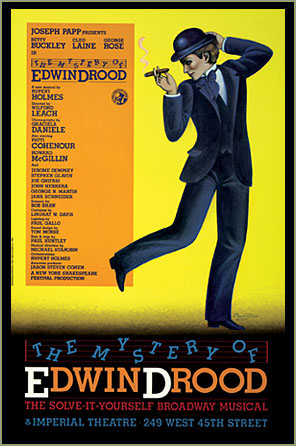
Version 1
Mystery of Edwin Drood (The) (1985-12-Imperial Theatre-Broadway)
Type de série: OriginalThéâtre: Imperial Theatre (Broadway - Etats-Unis) Durée : 1 an 5 mois 2 semaines Nombre : 24 previews - 608 représentationsPremière Preview : 12 November 1985
Première: 02 December 1985
Dernière: 16 May 1987Mise en scène : Wilford Leach • Chorégraphie : Graciela Daniele • Producteur : Star(s) : Avec: George Rose (Mayor Thomas Sapsea / Your Chairman, Mr. William Cartwright), Howard McGillin (John Jasper / Clive Paget), George N. Martin (Rev. Mr. Crisparkle / Cedric Moncrieffe), Betty Buckley (Edwin Drood / Alice Nutting), Jana Schneider (Helena Landless / Janet Conover), John Herrera (Neville Landless / Victor Grinstead), Jerome Dempsey (Durdles / Nick Cricker), Cleo Laine (Princess Puffer / Angela Prysock), Joe Grifasi (Servant (Philip Bax)), Peter McRobbie (Stage Manager, Barkeep, Harold / James ThrottleCommentaires : During the Broadway run the title was changed to Drood, primarily for publicity purposes.
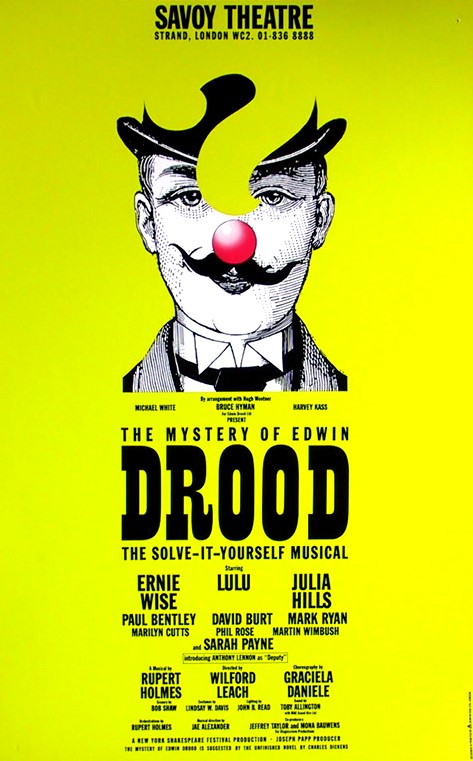
Version 2
Mystery of Edwin Drood (The) (1987-05-Savoy Theatre-London)
Type de série: Original LondonThéâtre: Savoy Theatre (Londres - Angleterre) Durée : 1 mois 4 semaines Nombre : 68 représentationsPremière Preview : 07 May 1987
Première: 07 May 1987
Dernière: 04 July 1987Mise en scène : Wilford Leach • Chorégraphie : Graciela Daniele • Producteur : Star(s) : Avec: Ernie Wise (Chairman/ William Cartwright), Lulu (Princess Puffer/Angela Prysock) , Julia Hills (Edwin Drood/Alice Nutting), Kevin Ranson (Stage Manager/ James Throttle), David Burt (John Jasper/Clive Paget), Paul Bentley, Martin Wimbush, Amanda DaintyCommentaires : The 1985 Broadway production with Betty Buckley and Cleo Laine ran for 608 performances and picked up four Tony Awards, and yet the London version was a flop.
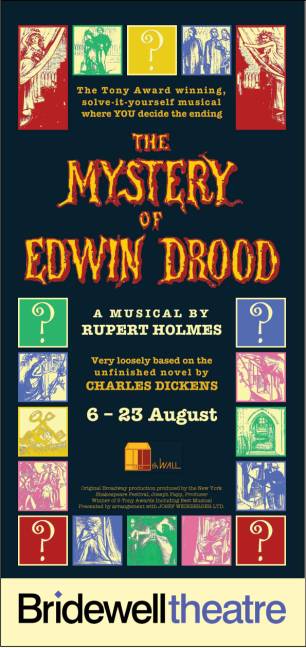
Version 3
Mystery of Edwin Drood (The) (2003-08-Bridewell Theatre-London)
Type de série: RevivalThéâtre: Bridewell Theatre (Londres - Angleterre) Durée : 2 semaines Nombre : Première Preview : 06 August 2003
Première: 06 August 2003
Dernière: 23 August 2003Mise en scène : Rachel Moorhead • Chorégraphie : Edz Barrett • Producteur : Star(s) : Avec: John Horwood (Chairman), Annabelle Williams (Princess Puffer), Melanie Morrisey (Edwin Drood), Jonathan Rose (Stage Manager/James Throttle), Paul Francis (John Jasper), Chloe Faine, Tessa Vale, Wojtek Godzisz, John Pyle, Cameron Smillee, Freddy Henry, Ian Buckingham
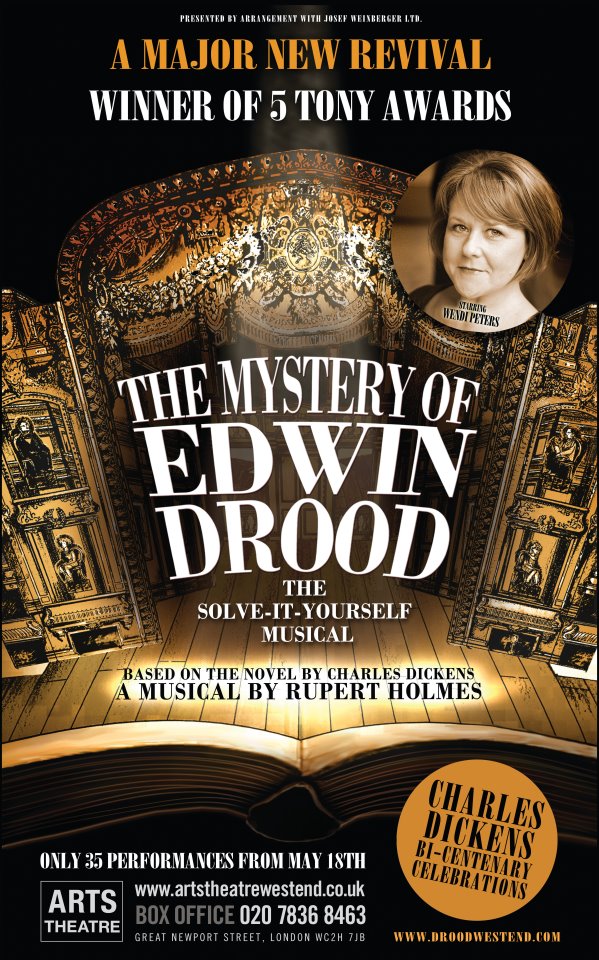
Version 4
Mystery of Edwin Drood (The) (2012-04-Landor Theatre-London)
Type de série: RevivalThéâtre: Landor Theatre (Londres - Angleterre) Durée : 3 semaines Nombre : Première Preview : 11 April 2012
Première: 11 April 2012
Dernière: 05 May 2012Mise en scène : Matthew Gould • Chorégraphie : Producteur : Star(s) :

Version 5
Mystery of Edwin Drood (The) (2012-04-Landor Theatre-London)
Type de série: RepriseThéâtre: Arts theatre (Londres - Angleterre) Salle : Main StageDurée : 1 mois Nombre : Première Preview : 18 May 2012
Première: 18 May 2012
Dernière: 17 June 2012Mise en scène : Matthew Gould • Chorégraphie : Producteur : Star(s) :
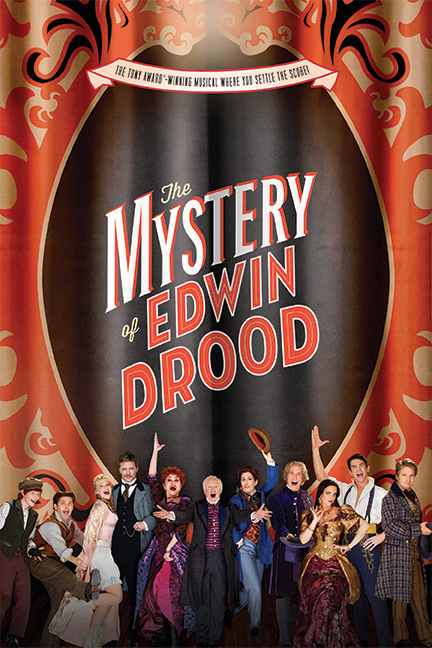
Version 6
Mystery of Edwin Drood (The) (2012-11-Studio 54-Broadway)
Type de série: RevivalThéâtre: Studio 54 (Broadway - Etats-Unis) Durée : 3 mois 3 semaines Nombre : 28 previews - 136 représentationsPremière Preview : 19 October 2012
Première: 13 November 2012
Dernière: 10 March 2013Mise en scène : Scott Ellis • Chorégraphie : Warren Carlyle • Producteur : Star(s) : Avec: Stephanie J. Block (Edwin Drood/Miss Alice Nutting), Will Chase (John Jasper/Mr. Clive Paget), Gregg Edelman (Reverend Mr. Crisparkle/Mr. Cedric Moncrieffe), Jim Norton (Chairman/Mr. William Cartwright), Chita Rivera (The Princess Puffer/Miss Angela Prysock), Andy Karl (Neville Landless/Mr. Victor Grinstead), Jessie Mueller (Helena Landless/Miss Janet Conover), Betsy Wolfe (Rosa Bud/Miss Deirdre Peregrine)
Pas encore de video disponible pour ce spectacle